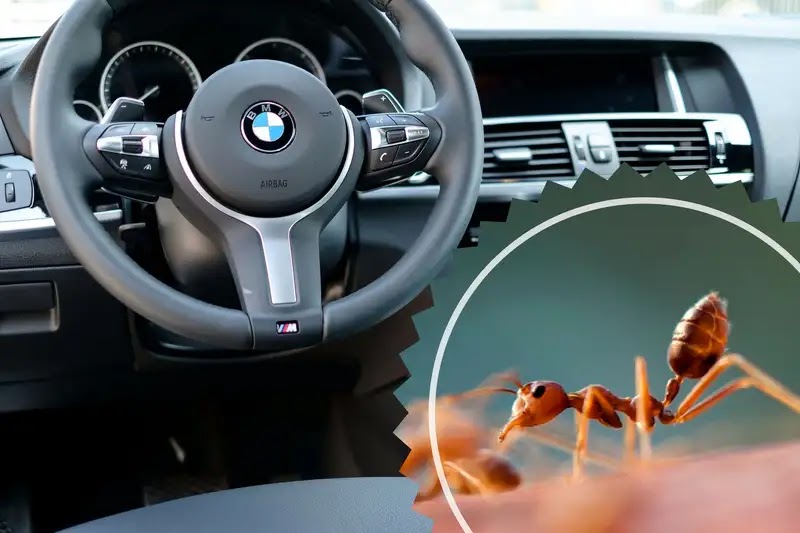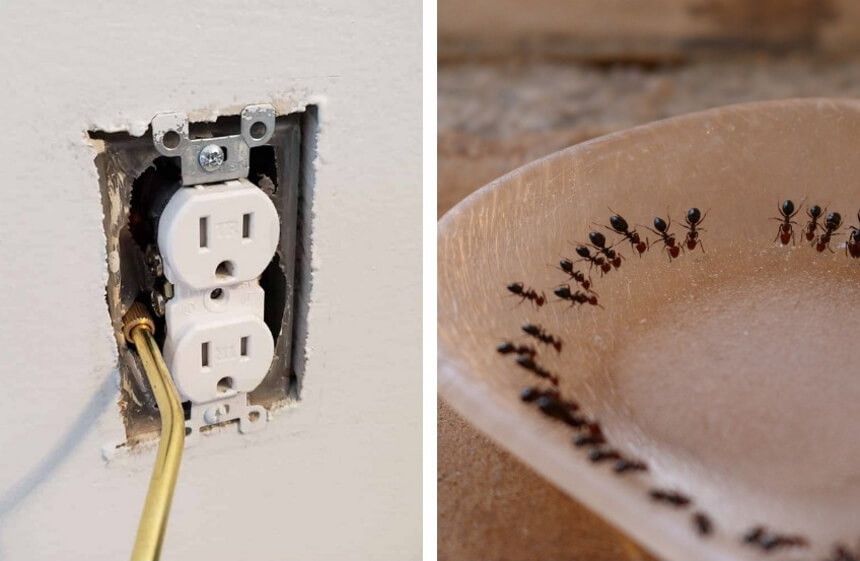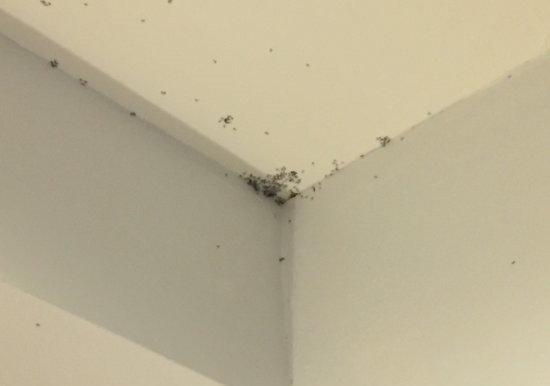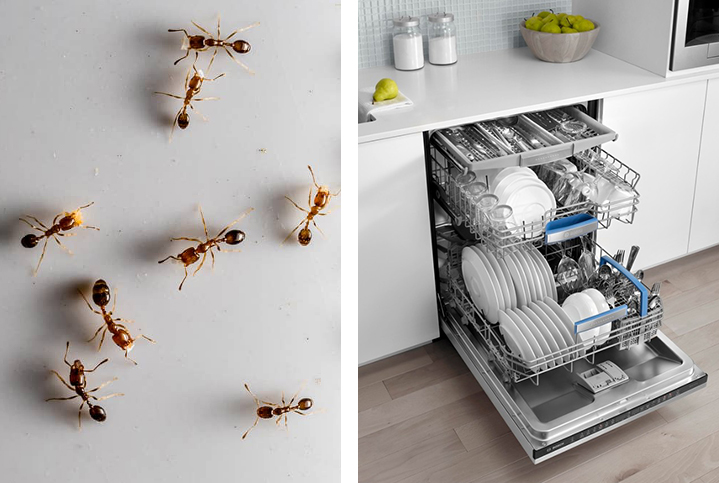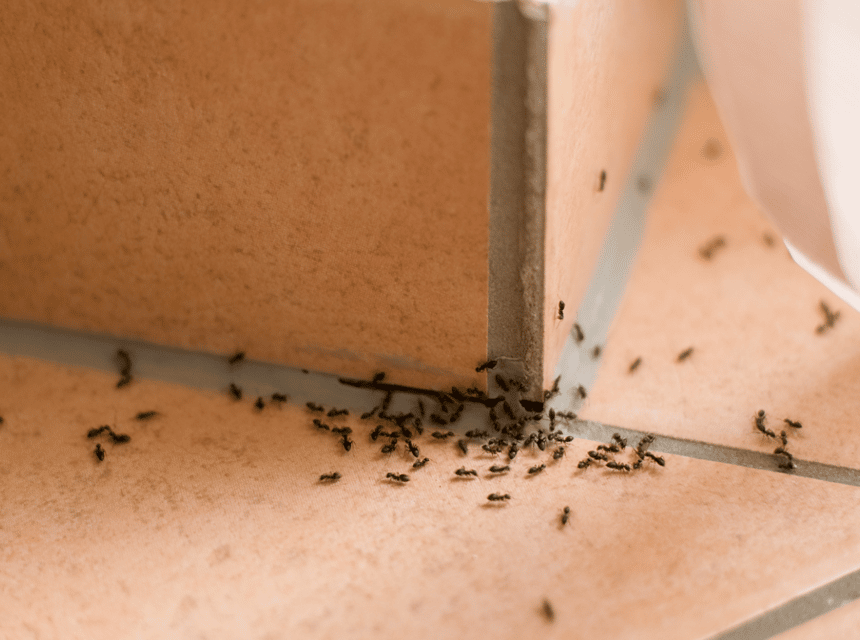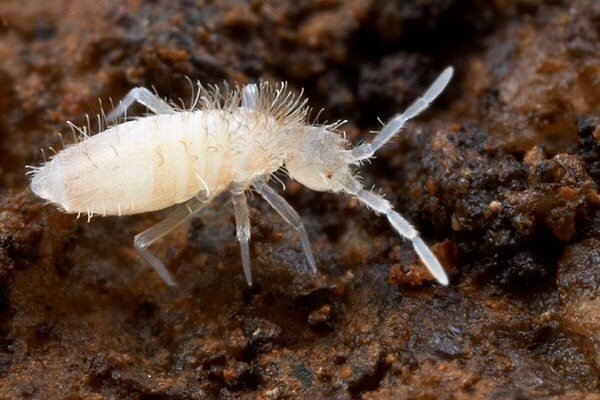

We have over 12,000 species of ants worldwide, which can be found almost anywhere on earth. Of those species, you can find different types of ants in the United States. The black ant is also known as the tree ant, sugar ant, or carpenter. These ants live in wooded areas, such as forests and woodlands, but have also been spotted in urban areas because they tend to live inside homes and other buildings when possible.
If you’ve discovered that they have taken over your house or apartment, you may wonder how to get rid of these black ants. In this article, we have highlighted some methods on how to get rid of black ants in no time before they cause any damage.
Identifying black ants is easy if you know what you’re looking for. The first step is to look at the antennae of the ant. If the antennae are 12-segmented, that’s an American Ant. American ants can be as small as 1/16th of an inch long and up to 1/4 inch long. They are usually black and live in areas with damp soil or mulch. They have a bad habit of biting humans and other animals on their feet which causes itchiness.
Black ants are most common in the United States and primarily live outside. However, they often come into homes when it rains, which is why they are more common in humid climates like Florida and Louisiana. These pesky ants can also be found indoors, though their small size and ability to go through small openings means you may not notice them until they have gained a foothold inside your home. They can also be found in other areas, including parts of Australia, Asia, Africa, Europe, and South America.
These ants frequently reside in colonies with many queens. This can lead to massive colonies and infestations. They also leave pheromone trails that ants may follow directly to your house. These tracks are most likely to be seen on the walls of your home and the walkways.
Black ants have stinging cells, but they will not harm you because they are so little. However, large numbers in your home will most likely irritate you if they succeed. Lastly, they crawl over everything they can, making them bacteria carriers.
When black ants invade your house, they are searching for food and water. You’re more likely to encounter an ant infestation in your house during the summer or other dry months because it’s the closest water source to most insects. While it is normal, no one likes black ants swarming in their house. So below are a few methods to get rid of black ants in your home.
Ant baits are similar to ant traps in that they rely on scent pheromone trails and the ant’s natural behaviour of looking for food. The ant bait stations, which mimic a pleasant substance and food odors, contain food laced with hazardous chemicals to ants in close contact or swallowed after some time.
Worker ants are lured to the laced sources of food and carry it back to the colony for all the ants, including the queen, who eventually partakes. The poisons in the bait will gradually kill them and eliminate the ant infestation in your home. Terro liquid killer, Amdro ant bait, and Advion ant bait are some effective ant bait available. These are excellent solutions since ant bait targets and treats the whole colony.
Ant repellent or insect spray can refer to anything that keeps ants away from your home and makes it undesirable for infestation. These things are frequently related to odors or tastes that ants avoid owing to an intrinsic aversion.
Applying an ant repellant may establish a barrier between your home and black ants, causing them to flee rather than enter.
This differs from ant baits because ant repellents do not always kill black ants. Instead, ant repellents were devised to provide an uninviting atmosphere that makes them settle in another location, not your home.
Suppose you prefer not to use chemicals in your house for any reason; you can use natural ways to repel ants from your home.
Glass cleaners, dishwashing solutions, pepper or chili powder, white vinegar and water, and hot water are some options available to you.
To limit the number of ants in your house without toxins or chemicals, use a paper towel and a combination of any glass cleaner and dish detergent to wipe down locations where you regularly see ants. While this does not completely repel the ants, it erodes the scent trail other ants left, drawing additional ants to your home.
Removing their smell trail with the DIY solution makes them less likely to recognize your home as a food source and will see no need to enter.
A typical DIY cleaning remedy, a spray bottle of white vinegar and water, can also help repel ants from surfaces treated.
While washing your surfaces, the vinegar will form a barrier between your house and the ants, repelling them because the fragrance bothers black ants.
Unlike chili powder or black pepper, insects, including ants, are still repelled by vinegar after it has dried because they can detect the residual fragrance of the vinegar.
Vinegar is also an efficient ant-killing agent. While it will not damage ants that do not come into close contact with the vinegar-like ant baits, it will assist reduce ants and infestations around your house.
Black pepper, cayenne pepper, and chili powder are known to irritate insects, particularly ants. While this will not damage the ants, it will act as a repellant and keep them away from regions with this aroma. Add pepper or chili where you have observed ants swarm or enter to employ this approach as an ant treatment.You may also put them under appliances and in locations where ants are known to cluster, such as kitchen countertops and bathrooms.
Unfortunately, despite being a proven efficient ant treatment, you will still have to sweep your house, causing the repellant to be removed.
Targeting the ant’s nest is the most effective technique to treat an ant infestation permanently. While they are most commonly found in your garden, they can also be discovered in house plants or other places of the house. Boil a saucepan of water and slowly pour the liquid into the nest’s aperture or on top of it to soak the entire exterior to eradicate the ants’ nest. The ants will be killed instantly by the hot water.
Using chemical pesticides to kill ants may pollute groundwater and harm bees, butterflies, and other valuable species. Instead, try these natural ant control methods to eliminate black ants outside the home. They’re better for your family and more eco-friendly.
Diatomaceous earth (DE) is composed of microscopic animals known as diatoms that leave behind small fossils.
Although the fossils are too tiny to harm people, they are lethal to ants. DE particles sever ants’ exoskeletons, dehydrating and finally killing them.
Step 1: Purchase food-grade (rather than industrial-grade) DE. It looks like powder and is generally packaged in a bag. It’s available at most garden supply stores.
Step 2: Sprinkle the powder over anthills, ant trails, and other places you’ve noticed ants gathering.
Step 3: Sprinkle the powder around patios, driveways, swing sets, and other high-traffic areas of your yard.
Step 4: Sprinkle powder around your home’s windows, doors, vents, and other probable access spots. Spread DE powder about your sink or pantry, where ants are most likely to locate a food supply if you already have ants inside.
Baking soda suffocates ants by obstructing their spiracles, breathing holes in their exoskeleton. In addition, baking soda, when consumed, causes a chemical reaction within the ant that kills it.
Step 1: Sprinkle baking soda inside the anthill, around the nest, and along ant paths.
Step 2: Use baking soda to create a barrier surrounding your outdoor living spaces, potential access to your house, and interior food sources. Ants may pass the barrier, but they should perish quickly.
Step 3: To produce an ant bait for more broad control, combine baking soda and powdered sugar in equal parts. Ants are drawn to the sugar and eat it, then bring it back to the nest for additional ants to consume. They’ll die after ingesting the baking soda and sugar.
Artificial sweeteners containing saccharin or aspartame, which function as neurotoxins in ants, include Splenda, Nutrasweet, and Equal. They kill ants by causing brain cell damage.
Step 1: To attract ants, combine 1 tablespoon of artificial sweetener with 1 tablespoon of milk.
Step 2: Place the solution in a dish where ants will likely come across. Again, place this in many areas for the best result.
Step 3: Leave the baits alone and do not kill ants passing through. Allow the ants to bring the bait back to the nest, where it will be eaten by ants staying underneath (and ideally the queen).
Fill the whole nest with regular water from the hose to drown subsurface ants. Because some ants may survive for 24 hours underwater, you may need to soak the colony more than once.
Step 1: Scrape the aboveground anthill away to reveal the subsurface nest.
Step 2: Use the hose and aim at the ant nest’s entrance. Allow the water to run for 30 minutes.
Step 3: Repeat as necessary if the colony is still active.
The soap degrades ant cell membranes and dissolves the protective wax covering, preventing them from losing water and dying from dehydration. When you add oil, it clogs the spiracles (which ants require to breathe) and suffocates them.
Step 1: Combine a tablespoon of liquid dish soap or 14 cups of Castile soap for every quart of water. Add canola, olive, or vegetable oil to make the combination more effective.
Step 2: Spray any ants you observe outside the colony with soapy water to kill them on contact.
Step 3: Spray the solution into anthills around the house (or, if possible, inside ant nests) to kill the ants.
Ants enter your vehicle because they see it as a feasible food or water source. Sure, they build nests, but once established, ants seek food and water to bring back, detecting the essentials by scent. This problem may rapidly become out of hand, so act promptly if you see ants in your car.
Tip #1: Wash your automobile from head to toe. When you detect ants in your automobile, the first thing you should do is detail it thoroughly. Wipe down all surfaces, wipe the glass, and inspect locations such as behind the seats, seat cracks, under vehicle seats, below floor mats, and storage spaces such as the trunk, glovebox, and center console.
Tip #2: Try some DIY solutions. If you’re not keen on placing professional ant-killing goods in your automobile, you may start with at-home solutions. You can use some of the DIY solutions we’ve highlighted above.
Tip #3: Invest in ant spray and traps. If home treatments aren’t cutting it, it’s time to call in the big guns. The spray will kill the ones you notice immediately, while bait/traps will care for those you don’t see.
Tip #4: Switch parking spots. It’s also a good idea to change where you park; this will mislead the ants and prevent them from following their smell trails to your car.
Here are some basic ways to prevent ants from invading your yard and home:
How Do You Prevent Little Black Ants?
You can avoid getting little black ants by keeping the area around your home dry. You can also use food-grade diatomaceous earth in cracks, crevices, and other hard-to-reach places for an added barrier against little black ants.
What Do Little Black Ants Eat?
Little black ants feed on honeydew (a sweet liquid produced by aphids or scale insects) or sugary foods that they find near your home. You can get rid of them from entering your kitchen or other areas of the house by not leaving dirty dishes out, not spilling anything sweet on surfaces like countertops, tables, and floors, and washing down counters with a mild soap solution every day.
Are Little Black Ants Dangerous?
Little black ants are not dangerous but can become a nuisance by coming inside your home and looking for food. The bite of a little black ant is only painful because of its size, but it shouldn’t pose any real harm.
Don’t take black ants lightly! If you’re dealing with an infestation, it’s time to take action and find out where they’re coming from. Knowing their nesting areas and food sources will help determine a plan of how to get rid of black ants. Chemical control is effective alongside non-chemical approaches to eliminate black ants.
These approaches include using household borax or diatomaceous earth to eliminate unwanted insects indoors and treating the home with non-toxic sprays or powders that are safe for children and pets. The key is to make sure that you know which type of ants you’re dealing with before taking any drastic measures.
